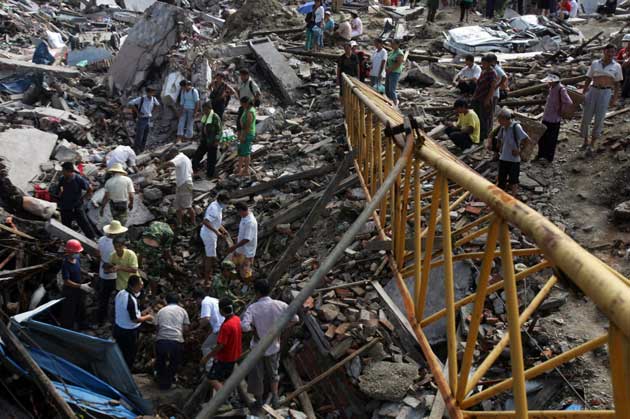Disaster volunteers ‘will be subject to Whitehall orders’
Cost to the taxpayer will mount, as salaried staff on overtime replace charities working for nothing

Britain’s volunteer lifesavers claimed yesterday that Whitehall bureaucracy is jeopardising the lives of thousands of people in disaster zones around the world.
UK charities that are often first on the scene when international disasters strike claim a secret deal to hand fire chiefs control of the UK response to overseas emergencies could prevent them providing expert help.
The change could also cost the taxpayer more money, as the UK will be sending more salaried staff on overtime, rather than volunteers, to help on search and rescue missions.
The Department for International Development and Department for Communities and Local Government have struck a deal to put the co-ordination of Britain’s disaster response operations overseas under control of the UK Fire and Rescue Service.
The International Development Secretary, Douglas Alexander, said the changes aimed to establish “a more efficient and workable arrangement” for providing help in overseas emergencies. He said the decision to go above the charities’ heads was taken as “they were finding it difficult to co-operate and reach agreement” – a claim the groups furiously deny.
Expert relief charities including Rapid UK and the International Rescue Committee are traditionally among the first to respond to global emergencies, with teams prepared to drop everything and travel to disaster scenes.
The non-governmental organisations often benefit from their semi-official status to gain access to these zones, when national governments may be sealing off the areas to all but local rescue teams. However, the decision to give the UK’s established fire services primacy threatens to block charities from taking part in future rescue efforts.
“We have not cut out the NGOs: we have built them into a second-phase response,” said Mike Thomas, of the Chief Fire Officers Association. “If a disaster happens when there is a domestic threat, we may decide not to deploy a full team from our staff, in which case we would deploy from the NGOs to fill the gaps. The NGOs could also provide relief cover for our people if they have to attend an emergency for a longer period.”
But officials at Rapid UK, which has won awards and honours for its work, claim the changes limit their ability to respond effectively in future.
John Holland, the organisation’s operations director, said the move will incur greater costs, as Britain would be sending fewer volunteers and more salaried rescuers entitled to overtime. “We will still try to attend emergencies, whether we are officially chosen or not, but not being part of the official response will make it more difficult to be effective,” he added.
Join our commenting forum
Join thought-provoking conversations, follow other Independent readers and see their replies
Comments
Bookmark popover
Removed from bookmarks